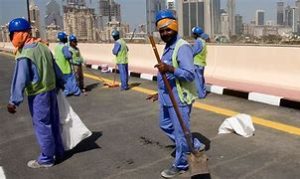
Umm Muhammed Umar
The issue of migrant workers has once again surfaced out of the Gulf. Qatar in particular, hosting the 2022 FIFA World Cup is witnessing construction on an unprecedented level taking place. The Gulf has been notorious in connection with migrant labour. For decades, impoverished migrant laborers from all over the world, especially India, Pakistan, Bangladesh, Nepal, the Philippines, and Indonesia, serving in different capacities, as housemaids, construction workers and so on, have lamented, using various forms of media, in their countries of origin in particular, the treatment meted out to them by companies and individuals that employ them. There are many good stories too, where workers coming from abroad were looked after very well. But unfortunately, there are people, who also talk of virtual slavery in some instances. Now, people have the opportunity to use various media platforms to highlight whether something is good or not. Radio Islam spoke to journalist, Mohamed Opsahl.
Opsahl said that there were many improvements ahead of the World Cup in Qatar and that the country has introduced a new law that majority of workers no longer need exit permits to leave the country. Qatar has also recently allowed employees to change their employment without needing to obtain a non-objection certificate from the previous employer. A non-discriminatory minimum wage has been introduced which is equivalent to US $275, as well as free housing and food. Previously, wages had been based on nationality. Qatar has set up visa centres in India, Sri Lanka, Indonesia, Nepal, Bangladesh, Pakistan, Philippines to recruitment easier and to avoid exploitation of workers while still in their home countries. However, despite the many developments, the rules are still often flouted by employers, with the government lax on enforcement.
While Qatar is an economically developed country, with one of the highest GDP in the world, Opsahl said that there was no trade union membership in Qatar. He said that blue collar workers only protested when faced with an extreme situation, for example unpaid salaries for months on end, where they can no longer even purchase food. The last protest had generally consisted of construction workers. However, there are many who are employed as domestic workers, who tend to be a bit more vulnerable when it comes to being misused and abused and exploited with long hours, etc. Opsahl said, “from what my experience has been in the last seven years in Qatar, I think only the Philippine Embassy is proactive when it comes to protecting their citizens.” He added, “we don’t have much access to these households.”
It must be stressed that these reports are not exclusive to Qatar alone; there are many people who have had positive experiences in employment by way of chances and opportunities unavailable in their countries of origin.







0 Comments